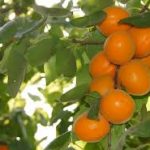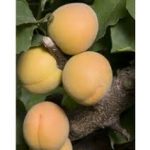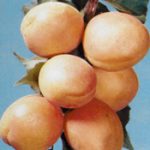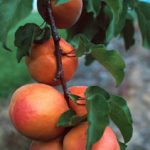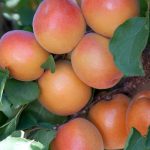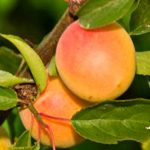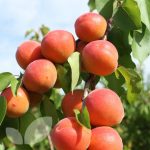Apricot is a fruit or the tree that bears the fruit, of several species in the genus Prunus (stone fruits). [1] Apricot health benefits include relieving constipation, strengthening the bones, boosting metabolism, treating ear pain, treating skin conditions, treating anemia, combating asthma, promoting eye health, treating fever, improving the quality of blood, helping prevent cancer, and improving heart health.
Pectin is another ingredient found in a significant amount in apricot kernel extract (2,3). It is supposed that pectin has a prominent role in protection against chemical-induced colitis as has been reported previously (4). Pectin can be fermented by microorganisms within the gut to form short-chain fatty acids and these fatty acids can be consumed by epithelial cells to stimulate cell proliferation on colon mucosal layers (5). The beneficial effect of pectins against peptic ulcers has been previously suggested by Hamauzu and coworkers in the study of Cydonia oblonga anti-ulcerative effect (7).
Control groups demonstrated the highest level of inflammation, necrosis, and infiltration of the immune cells considering macroscopic and histopathologic evaluations and confirmed the method’s efficacy. Prednisolone-treated groups showed a significant reduction in all macroscopic and histopathologic scores; however, it was not able to normalize the affected areas. This could be attributed to the short period of treatment and/or acute method of a chemically induced model of colitis (8,9).
Types of Apricot
The different kind of apricot has various flavors from sweet to sour.
Chinese Apricot
Chinese Apricot is the fruit from yellow to medium-orange skin with a great taste as well as structure. It does not require the other pollinator as it is self-fruitful. The cooling requires 700 hours. It is early bearing with a heavy producing range.
Gold Cot
The gold cot apricot is the tree which is about 15 ft. At the start of the spring, the tree has white or light pink flowers. The fruit is provided by the tree at the start of the summer time around June. The fruit is moderate to large in size with orange skin. This tree grows well in Minnesota to Austin, Texas. At the beginning of the spring, it must be trimmed.
Tilton
It is a medium size fruit with an orange skin. It can be also be freeze, canned and dried. The trees are resistant against the late frosts. It is good for cooler as well as hotter climatic conditions.
Wenatchee
It is a big size fruit which is also known as Moorpark. It has light yellow skin with a delicious taste. It is self-pollinating. It grows well in nicely drained and rich soil.
Goldbar
It is a light yellow-orange fruit with reddish blush. It is huge in size with a spherical to oval in shape and compact sides. The flesh of the fruit is juicy.
Gold Kist
Gold Kist is the first maturing fruit but usually a challenging to develop. It develops in well-drained and rich soil. It is huge in size with orange freestone skin and superior taste. It can be used for drying, canning and cooked goods.
Tomcot
It is a medium to large size fruit with 5.4 cm in diameter and oval in shape. The skin of the fruit is light orange in color. The side which is encountered with the sun develops a blush. It has a sweet taste with mild orange flesh. It is not suitable for canning.
Autumn Glo Apricot
Late season apricot with tremendous flavor. Ripens in the first two weeks of August. Fruit is medium-sized with good color. One of the highest-scoring apricot varieties to date at Dave Wilson Nursery fruit tastings. 500 hours or less. Self-fruitful. USDA Zones 7-9. (Zaiger)
Blenheim (Royal) Apricot
All-purpose freestone. Sweet, aromatic, flavorful – the long-time No. 1 apricot in California. Early bloom. Late June harvest in Central CA. 400 hours or less. Self-fruitful. USDA Zones 7-8.
Bongo Fruiting-Flowering Apricot Prunus mume ‘Bongo’
Prunus mume ‘Bongo’. Flowering apricot, large fruit to 2 inches, pinkish-white flowers.
Brittany Gold Apricot
This sweet apricot is a very consistent producer in the Dave Wilson test orchard and has proven to perform in tough climates where no other apricots do. This large, firm fruit has an extremely long season for an apricot, hanging for two weeks or more at the end of July. Self-fruitful. Estimated chilling requirement 500-700 hours. (U.S. Plant Patent No. 13504)
Canadian White Blenheim Apricot
One of the all-time top-scoring apricots in Dave Wilson Nursery blind taste tests. Syrupy sweet white flesh with a firm texture. 700 hours. Pollenized by another late-blooming apricot. USDA Zones 4-7.
Earlier-Autumn Apricot
Wonderful flavor as tested by Dave Wilson Nursery both fresh and dried. Will please even the most critical of apricot lovers. Late harvest, first two weeks of August. 500 hours or less. Self-fruitful. (Pat. No. 9937). USDA Zones 7-9. (Zaiger)
Flavor Giant Apricot
One of the earliest fruits of the year (ripens late May/early June in Central CA). Heavy crops of extremely large, sweet-tart, flavorful fruit. 500 hours or less. Self-fruitful. USDA Zones 7-9.
Flora Gold Apricot
All-purpose freestone. Early harvest, 2-3 weeks before Blenheim (Royal). Very good quality, reliable producer (produces when other varieties do not). Good choice for backyard apricot. 400 hours or less. Self-fruitful. USDA Zones 7-9. (Zaiger)
Harcourt Apricot
From Canada. Frost hardy late bloom. Resists brown rot and perennial canker. Medium to large fruit ripens early to mid-June in Central CA. The sweet, juicy, rich flavor is one of the best. 700 hours. Self-fruitful.
Harlow Apricot
Late-blooming, productive tree, proven in coastal Northwestern climates. Medium size, bright orange fruit sometimes blushed red. Orange freestone flesh is firm, sweet, flavorful. Resistant to perennial canker and brown rot resists cracking. Originated in Ontario, Canada. Introduced in 1982. 800 hours. Self-fruitful. USDA Zones 5-9.
Hunza Apricot
Native to northwest Pakistan, the fruit is sweet and flavorful. Very cold hardy.
Katy Apricot
Large, all-purpose, flavorful freestone. Tree ripe fruit is subacid (not tart). A favorite apricot for warm winter climates. Early harvest, 3-4 weeks before Blenheim (Royal). 200 to 300 hours. Self-fruitful. USDA Zones 7-9.
Model Fruiting-Flowering Apricot Prunus mume ‘Model’
Prunus mume ‘Model’. Spectacular early pink blooms, 1″ to 1 1/4″ fruit. Sometimes used for pickling.
Moorpark Apricot
A long-time favorite of apricot fanciers for its exceptionally rich flavor and aroma. Reliable producer. Used fresh and for canning. 600 hours. Self-fruitful. USDA Zones 6-9.
Nugget Apricot
Large, flavorful yellow freestone. Attractive orange skin blushed with red. Ripens mid-June in Central CA, 1-2 weeks earlier than Blenheim. Vigorous, productive tree. Originated in Ontario, CA. Introduced in 1956. Estimated chilling requirement 500 hours or less. Self-fruitful
Patterson Apricot
Reliable, heavy-bearing commercial variety. Very firm, medium-sized fruit suited to canning, drying or fresh use. 600 hours. Self-fruitful. USDA Zones 6-9.
Perfection Apricot
Very productive, hardy tree. Fruit is very large, sweet, and juicy. Performs well where spring frost is a problem. USDA Zones 4-7.
Pixie-Cot Miniature Apricot
Compact tree with medium-sized, fine-quality fruit. First genetic dwarf apricot to meet the flavor standards set by Dave Wilson Nursery for release to the home gardener. Ripens first week of June in CA’s Central Valley. 500 hours. Patent pending. (Zaiger)
Puget Gold Apricot
Proven producer of large, flavorful fruit in Western Washington. Recommended for other western climates where spring rains and frosts limit apricot culture. Harvest early August. 600 hours. Self-fruitful. USDA Zones 6-9.
Rival Apricot
Aromatic, slightly tart, large oval fruit. Heavy midseason bloomer, good producer. Early harvest of orange-red blushed or speckled red fruit with deep orange flesh. Reliable variety where frost hardy traits are required. Requires an early-blooming pollenizer. Zone 5-8.
Royal Rosa Apricot
Extremely vigorous – more disease tolerant than other apricots. Bears are young and heavy. Especially nice fruit: sweet, low acid, fine flavor. Very early harvest (late May in Central CA). Excellent backyard apricot. 500 hours. Self-fruitful. USDA Zones 7-9. (Zaiger)
Nutritional Value of Apricot
| Nutritional value per 100 g (3.5 oz) | |
|---|---|
| Energy | 201 kJ (48 kcal) |
|
Carbohydrates
|
11 g
|
| Sugars | 9 g |
| Dietary fiber | 2 g |
|
Fat
|
0.4 g
|
|
Protein
|
1.4 g
|
| Vitamins | Quantity%DV† |
| Vitamin A equiv.
beta-Carotene
lutein zeaxanthin
|
12%
96 μg 10%
1094 μg 89 μg
|
| Thiamine (B1) |
3%
0.03 mg |
| Riboflavin (B2) |
3%
0.04 mg |
| Niacin (B3) |
4%
0.6 mg |
| Pantothenic acid (B5) |
5%
0.24 mg |
| Vitamin B6 |
4%
0.054 mg |
| Folate (B9) |
2%
9 μg |
| Vitamin C |
12%
10 mg |
| Vitamin E |
6%
0.89 mg |
| Vitamin K |
3%
3.3 μg |
| Minerals | Quantity%DV† |
| Calcium |
1%
13 mg |
| Iron |
3%
0.4 mg |
| Magnesium |
3%
10 mg |
| Manganese |
4%
0.077 mg |
| Phosphorus |
3%
23 mg |
| Potassium |
6%
259 mg |
| Sodium |
0%
1 mg |
| Zinc |
2%
0.2 mg |
| Other constituents | Quantity |
| Water | 86 g |
| [10] | |
| Percentages are roughly approximated using US recommendations for adults. Source: USDA Nutrient Database | |
Health Benefits of Apricot
- Relieve Constipation – Apricots are rich in fiber and are, therefore, good for smooth bowel movements. They are often recommended for patients who regularly suffer from constipation due to their laxative properties. Fiber is a way to bulk up the stool. In this way, it becomes easier to transport through the bowels to its eventual excretion from the body. Fiber stimulates the gastric and digestive juices that help absorb the nutrients and break down the food for easier processing. [11] Furthermore, fiber also activates the peristaltic motion of the digestive tract, and those smooth muscle movements are what keep your bowel movements regulated.
- Strengthen Bones – Apricots have significant or moderate amounts of all the minerals necessary for bone growth like calcium, phosphorous, manganese, iron, and copper. [12] Therefore, eating apricots can ensure the healthy growth and development of your bones, as well as prevent various age-related conditions, including osteoporosis.
- Improve Heart Health – Apricots are a wonderful way to protect your heart from a wide variety of diseases, including atherosclerosis, heart attacks, and strokes. [13] A high amount of vitamin C, as well as potassium and dietary fiber, all contribute to good cardiovascular health. Vitamin C protects the heart from free radicals, potassium lowers blood pressure by relaxing the tension of blood vessels and arteries, while dietary fiber scrapes the excess cholesterol from the lining of the vessels and arteries, thereby clearing them and reducing the strain on the heart. Altogether, these properties of apricots make them ideal for boosting heart health.
- Improve Metabolism – Fluid levels throughout the body are dependent mainly on two minerals, potassium, and sodium. [14] The high amounts of potassium in apricots have been linked to maintaining fluid balance in the body and ensuring that energy is properly distributed to the right organs and muscles. By maintaining a healthy balance of electrolytes, you can have more energy, reduce cramping, and keep blood and usable energy pumping through your body as you need it.
- Treat Earaches – Apricot oil is good for earaches, although the exact mechanism is still being studied. [15] Dripping a few drops into the affected ear canal should prove to be a fast remedy. According to scientists, the antioxidant materials present in apricot essential oil are responsible for relieving earaches.
- Cure Fever – Apricot juice is often given to patients suffering from fever because it provides necessary vitamins, minerals, calories and water to the body, while also detoxifying various organs. [16] Some people also use steamed apricot to relieve fevers. Its soothing, anti-inflammatory substance can also impact the body’s overall temperature level in sickness. Furthermore, it can reduce inflammation in other parts of the body, especially for people suffering from arthritis or gout.
- Treat Skin Disorders – Apricot oil is good for skincare. [17] It is quickly absorbed by the skin and does not keep it oily after application. Apricots are not just useful for maintaining the smooth and shiny appearance of the skin; it also aids in treating a number of skin diseases including eczema, itching, scabies, and a number of other irritating conditions. This is specifically due to the antioxidant compounds found in apricots. Not only does it have a healthy amount of vitamin A (60% of your daily requirement per serving), which has long been associated with healthier skin, but the antioxidants in apricots protect the skin from the effects of free radicals, which can lead to skin deterioration and signs of premature aging.
- Treat Anemia – Owing to the presence of iron and copper, apricots help in the formation of hemoglobin when you consume them. [18] This property helps in treating anemia. Anemia is basically an iron deficiency, and it can lead to weakness, fatigue, lightheadedness, digestive issues, and general metabolic dysfunction. Without red blood cells, the body can’t reoxygenate itself properly, and organ systems begin to malfunction. Iron is a key part of red blood cell formation, as is copper. Both of these minerals are present in apricots, making it a great tool to boost metabolism and keep the body functioning properly.
- Prevent Cancer – The seeds of apricot are believed to aid in the treatment of cancer. [19] Between the carotenoids and the other antioxidant compounds that apricots have, it is no surprise that they are a threat to free radicals. Free radicals are the dangerous byproducts of cellular metabolism that can cause healthy cells to mutate their DNA into cancerous cells. Antioxidants neutralize these harmful compounds and ensure that the body doesn’t contract conditions like cancer, heart disease, Alzheimer’s disease, and aging skin. Apricots have been directly linked to reducing the risk of cancer.
- Anti-asthmatic – It is also believed that apricot oil is anti-asthmatic in nature and helps in treating the disease and its related symptoms. [20] It has certain expectorant and stimulant qualities due to its essential oils. One of these can help to relieve pressure and stress on the lungs and respiratory system, thereby preventing asthma attacks before they begin.
- Eye Health – Dried apricots contain nutrients like Vitamin A which is required for good vision. Vitamin A is a powerful antioxidant that helps to remove free radicals and maintain the health of cells and tissues (21). Free radical damage can cause injury to the human eye lenses which can lead to cataracts or damage the eyes. Dried apricot intake reduces the risk of developing cataracts.
- To Treat Ear Pain – If you are suffering from a severe earache, then dripping a few drops of apricot oil into your ear canal should prove to be an effective remedy. As per scientists, the antioxidant content present in apricot oil is responsible for alleviating earaches.
- Helps During Pregnancy – Dried apricot has been used as herbal medicine for a long in pregnancy. This can cure infertility, hemorrhage, and spasms. The paste of this dried fruit can cure vaginal infections. This must be consumed moderately by pregnant and lactating mothers. During pregnancy, dried apricot fruits serve as excellent snacks instead of eating sweets and other snacks (22).
- Regulate Heartbeat – One of the best benefits of dried apricots includes the regulation of heartbeat. Dried apricots provide a very good source of potassium (23). Potassium is a mineral and electrolyte which is useful to regulate proper fluid balance. This helps in proper muscle function and regulates the heartbeat.
- Helps In Reducing Fever – Dried apricots help to reduce fever (24). Prepare a liquid or you can dilute with some honey using water. This can also give you relief from thirst.
- Dry Apricot Benefits For Skin – Dried apricots juice can be used to treat itching due to sunburn, eczema, and scabies. This also helps to clear acne and many other skin problems (25). Apricot scrub is often used to exfoliate the skin.
- Clean Digestive Tract – Dried apricots help to treat the digestive tract by acting as a mild laxative to flush out the unwanted wastes (25). This is useful to react with the body’s digestive juices and produces more of an alkaline environment to clean the digestive tract.
- Help Increase Haemoglobin Production – Dried apricots can be used for the production of hemoglobin that can treat anemia. This is because dried apricots contain minerals like iron and copper which produces hemoglobin (26).
- Enhances Skin Glow – Dried apricot oil is very useful for skincare (27). This can make your skin glowing and smooth. This is also a good remedy to cure sore ears.
- Apricot scrub – Apricot scrub is one of the most popular skincare products available. The ground apricot kernel is used in the scrub to get rid of dead skin cells, allowing your skin to renew itself. The exfoliating action of apricot scrub can help to get rid of fine lines and wrinkles. Apricot scrub can also help you to get an even skin tone. It removes and exfoliates damaged skin, revealing the new and lighter skin cells beneath. It is also useful for eliminating skin blemishes.
- Acne – The anti-inflammatory properties of apricot oil may help to treat acne and skin redness. The flesh of apricot is particularly beneficial for treating acne-prone skin. Apply a paste of apricot to cure acne and pimples. Apricot leaf juice is useful for treating scabies, sunburn, and eczema. Apricot scrub reduces blackheads, unclogs the pores, and deep cleanses the skin, preventing the occurrence of acne.
- Massage – Apricot oil is commonly used for massaging the body and skin. It is used in aromatherapy massages to keep the skin healthy and to balance the nervous system. Do not forget to consult your doctor before using it, especially if you have sensitive skin.
- Moisturizer – The hydrating properties of apricot kernel oil make it a natural moisturizer. The high levels of linoleic acid present in this oil maintain the moisture balance of the skin. It is a lightweight oil that gets absorbed into the skin, without leaving any greasiness behind. This oil is suited for all skin types, including oily and acne-prone skin. You can also add a few drops of this oil to your moisturizer or serum.
- Signs of aging – Regular consumption of apricot helps to maintain the elasticity and suppleness of the skin. Vitamin E in apricot helps to delay the signs of aging. It also tones and firms the skin. You can use the apricot paste as a facial mask to soften the skin.
- Treat skin damage – Apricot contains oleic acid and Vitamin A, which prevent skin damage. The anti-inflammatory properties of apricot are helpful for soothing minor skin conditions like eczema and dry skin.
- Apricot kernel oil – Several hair products claim to improve the growth and texture of the hair, but only a handful of these work. Instead of trying harmful and chemical-laden hair products, you can try apricot kernel oil to improve the health of your hair.
- Conditioning – Regular consumption of apricot can do wonders for your hair. It promotes sebum production in the scalp, keeping it conditioned and moisturized. Add a few drops of apricot kernel oil to your shampoo and conditioner to make the hair soft, smooth and manageable. It is also used as treatment oil before chemical treatments. You can also use apricot kernel oil to manage frizzy hair. Take a few drops of apricot oil and smoothen through the hair.
- Moisturized scalp – Regular application of apricot oil can help to make the hair shiny and soft. Massage your scalp with apricot oil to keep the hair roots nourished and conditioned. It also stimulates the follicles, stimulating hair growth.
- Dandruff – Apricot kernel oil is very beneficial for treating scalp conditions like an itchy scalp, dandruff, eczema, and psoriasis.
- Dried apricots – The benefits of dried apricots stem from the fact that the drying process strips the fruit of its water content, without altering the nutritional value. As a result, the nutritive value of apricots is concentrated into a much more potent form, enhancing its benefits. Dried apricots are long-lasting and are consumed widely as a nutritious snack.
- Iron – Dry apricot contains a relatively high concentration of iron than fresh apricot. The type of iron supplied by dried apricot is known as non-heme iron. The non-heme iron takes a long time to get absorbed into the body. Consume dried apricots with Vitamin C rich foods to increase the iron absorption rate. Half a cup of dried apricots provides nearly 12% of the recommended dietary allowance of iron.
- Antioxidants – Dried apricots contain high levels of antioxidants and other potent phytonutrients like lutein, zeaxanthin, and beta-cryptoxanthin. These compounds provide protection from free radicals and reactive oxygen species (ROS) that can cause aging, cancer, and other harmful diseases. The total antioxidant or ORAC value of raw apricot is 1115 mol TE per 100 grams.
- Nutrients – Dried apricots have a high content of Vitamin A, E, and beta-carotene. A half-cup serving of dried apricots provides 14% of the recommended amount of Vitamin A. Dried apricot contains high amounts of carbohydrates. In fact, half cup of dried apricots yields 3 times more calories than fresh apricots.
- Laxative/ Digestion – Dried apricots act as a natural laxative to flush out unwanted waste from the body. It also reacts with the body’s digestive juices, producing a more alkaline environment to aid digestion. Dried apricots are consumed before a meal to stimulate digestion. This contains the alkali that neutralizes acids (3).
- Controls High Blood Pressure – Dried apricots contain three times more potassium than bananas and contain only a trace of salt that helps to keep down blood pressure (28). Potassium has more water-retaining properties than sodium, which lowers blood volume pressure. Potassium in dried apricots also protects against heart disease.
- Muscle Building – Dried apricots contain potassium which is necessary for bodily functions like improving metabolism and roles of the tissues, organs, and other cells. Thus, it is important for muscle-building and normal body growth. It helps to regulate the levels of acid in the body and is useful for protein synthesis (29).
- Blood Clotting – Dried apricots contain Vitamin K that is required for blood clotting in case of injuries and to prevent excessive bleeding (30). Consume a cup of dried apricots daily to get 4 mcg of Vitamin K.
Chemical Ingredient of Apricot Oil and Benefits
The main chemical constituents of Apricot Kernel Carrier Oil are Oleic Acids, Linoleic Acids, Alpha-Linolenic Acid, Palmitic Acid, Stearic Acid, Vitamin A, and Vitamin E.
OLEIC ACIDS (OMEGA 9) are known to:
- Maintain the softness, suppleness, and radiance of skin and hair
- Stimulate the growth of thicker, longer, and stronger hair
- Reduce the appearance of aging, such as premature wrinkles and fine lines
- Eliminate dandruff and thereby support hair growth
- Boost immunity
- Exhibit antioxidant properties
- Prevent joint inflammation, stiffness, and pain
LINOLEIC ACIDS (OMEGA 6) are known to:
- Moisturize hair and promote its growth
- Facilitate wound healing
- Be an effective emulsifier in the formulation of soaps and quick-drying oils
- Exhibit anti-inflammatory properties
- Soothe acne and reduce chances of future outbreaks
- Promote moisture retention in skin and hair
- Make oils feel thinner in consistency when used in an oil blend, thus being beneficial for use on acne-prone skin
ALPHA-LINOLENIC ACID (OMEGA-3) is known to:
- Lessen inflammation
- Control blood clotting on the skin
- Soothe joint pain and ease stiffness to improve flexibility
PALMITIC ACID is known to:
- Have emollient properties
- Soften hair without leaving a greasy or sticky residue
- Be the most common saturated fatty acid
STEARIC ACID is known to:
- Have cleansing properties that purge dirt, sweat, and excess sebum from hair and skin
- Be an ideal emulsifying agent that binds water and oil
- Help products remain potent when stored for long periods of time
- Condition and protect hair from damage without diminishing luster or making it feel heavy
- Have exceptional cleansing properties
- Soften skin
VITAMIN A is known to:
- Protect skin against damage caused by UV radiation
- Slow the appearance of aging by smoothing wrinkles and fine lines
- Stimulate the production of collagen
- Stimulate cells regeneration to keep skin healthy, strong, and firm
- Facilitate faster healing of wounds
- Protect skin against toxins and bacteria and promotes cell production, thus boosting immunity
- Lighten unwanted blemishes and dark spots, thus balancing skin tone to create an even glow
- Slow the production of oil in the skin and clears pores, thereby preventing acne breakouts
VITAMIN E is known to:
- Have antioxidant properties that slow the look of aging and boost circulation
- Repair scarred and blemished skin
- Prevent moisture loss from skin and hair
- Offer soothing relief to skin that has been burned
- Deeply cleanse pores and balance oil production
From Where To Buy
- Intense Flavor & Aroma: Contains 48oz of fragrant and luscious Mediterranean infused apricots with a natural flavor essence and no sugar added
- Excellent Source of Dietary Fiber and Antioxidants: Vitamins A & E, and Potassium. No Sugar Added, Fat Free, Cholesterol Free, Gluten Free and Non-GMO, Kosher and Halal Certified
- Grown in Turkey, Packed in California: Our Ultimate Apricots are grown, hand-pitted and sun-dried in the Malatya Region of Turkey, and packed in sunny Vacaville, California; From our Family to yours!
- Touch Lock Seal Closure: Easy Open, Easy Seal to help maintain freshness
- Sharing Format: A favorite ‘go-to’ healthy sweet snack for kids and adults! Great on recipes too
or
- DELICIOUS LOW-CALORIE, LOW-CARB JAM - Good Good no added sugar stevia jam tastes delicious. With Low Calorie and carb advantage, you can add it into your Keto diet too! All our natural sweeteners carry the sweet taste with zero or very few calories.
- NO SUGAR, JUST NATURAL SWEETENERS - Traditional jams have more sugar and sweetened syrups added into the making of jams and jellies, but our Stevia-sweetened jams contain all natural ingredient that delivers excellent taste and guilt-free eating.
- MADE FOR KETO DIETS, VEGAN CONSUMERS & SUITABLE FOR DIABETICS - Now enjoy your jams and jellies without the worry of increasing the blood sugar levels in your body. It's easy to satisfy your sweet cravings regardless of your dietary requirements with our GOOD for you selection of jams that also taste GOOD.
- ALTERNATIVE TO CHEMICALLY PROCESSED SUGAR PRODUCTS - We believe that life should be sweet but without any added sugar. Added refined sugar (glucose or fructose) is the one of the single worst ingredient in modern diet. TRY GOOD GOOD STEVIA JAMS for sweetened sugar free experience!
- WHY CHOOSE GOOD GOOD? - The GOOD GOOD brand believes in offering a range of healthy sugar-free and free from sugar products. For the sweet taste in our recipes we use the highest quality natural sweeteners available without the added calories.
References
- https://www.ncbi.nlm.nih.gov/pmc/articles/PMC4314870/
- https://en.wikipedia.org/wiki/Apricot
- http://www.dailymail.co.uk/health/article-2020510/Popeye-ate-spinach-apricots-make-better-choice-How-manage-muscles.html
- http://ndb.nal.usda.gov/ndb/search/list?qlookup=09021&format=Full
- https://books.google.co.in/books?
